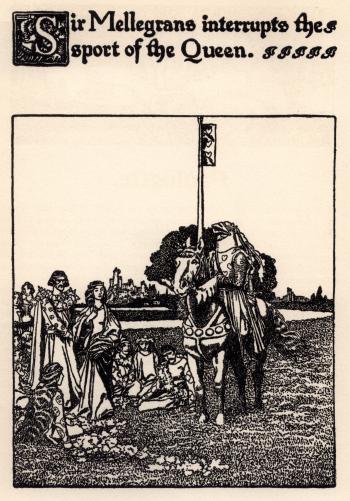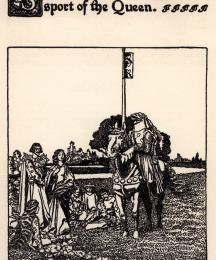Meleagant (or Melyag(r)aunce or Melwas) is best known as the wicked knight who abducts
Guinevere and is ultimately slain by
Lancelot. The earliest form of the name, Melwas, has been interpreted as meaning "prince of death" or "princely youth." The classic account of the abduction story is in Chrétien de Troyes's
Lancelot or the Knight of the Cart, in which Lancelot, because of his great love for Guinevere, suffers the ignominy of riding in a cart, a form of transportation reserved for criminals so that he can continue his quest to free her. The story is, however, told by others both before and after Chrétien. It can be found in
The Life of St. Gildas (c. 1130) by Caradoc of Llancarfan, who says that Melwas, ruler in the summer region ("in aestiva regione"), is attacked by Arthur because he carried off Guinevere. In this version, peace is restored with the help of Gildas. A Welsh poem, formerly thought to be a dialogue between Arthur and Guinevere is now titled the "Dialogue of Melwas and Gwenhwyfar." In addition to Chrétien's version, the story is found in French medieval literature in the Vulgate
Lancelot, which is the source for Malory's "Knight of the Cart" episode. In the modern period, the story of Guinevere's abduction by "Melvas" is told by Thomas Peacock in
The Misfortunes of Elphin (1829), in which the rescue is effected with the help of Taliessin. The slaying of "Mellyagraunce" by Lancelot is alluded to in Morris's
"The Defence of Guenevere". Other versions of the story are found in the novels
Galahad by John Erskine,
The Once and Future...
Read More
Meleagant (or Melyag(r)aunce or Melwas) is best known as the wicked knight who abducts
Guinevere and is ultimately slain by
Lancelot. The earliest form of the name, Melwas, has been interpreted as meaning "prince of death" or "princely youth." The classic account of the abduction story is in Chrétien de Troyes's
Lancelot or the Knight of the Cart, in which Lancelot, because of his great love for Guinevere, suffers the ignominy of riding in a cart, a form of transportation reserved for criminals so that he can continue his quest to free her. The story is, however, told by others both before and after Chrétien. It can be found in
The Life of St. Gildas (c. 1130) by Caradoc of Llancarfan, who says that Melwas, ruler in the summer region ("in aestiva regione"), is attacked by Arthur because he carried off Guinevere. In this version, peace is restored with the help of Gildas. A Welsh poem, formerly thought to be a dialogue between Arthur and Guinevere is now titled the "Dialogue of Melwas and Gwenhwyfar." In addition to Chrétien's version, the story is found in French medieval literature in the Vulgate
Lancelot, which is the source for Malory's "Knight of the Cart" episode. In the modern period, the story of Guinevere's abduction by "Melvas" is told by Thomas Peacock in
The Misfortunes of Elphin (1829), in which the rescue is effected with the help of Taliessin. The slaying of "Mellyagraunce" by Lancelot is alluded to in Morris's
"The Defence of Guenevere". Other versions of the story are found in the novels
Galahad by John Erskine,
The Once and Future King by T. H. White, and
Arthur Rex by Thomas Berger; in the play
Meliagrance and Guenevere; and in the film
The First Knight.
BibliographyLoomis, Roger Sherman. Arthurian Tradition & Chrétien de Troyes. New York: Columbia University Press, 1949.
Rhys, John. "Gwenhwyvar and Her Captors," Chapter III (pp. 49-70) of Studies in the Arthurian Legend. Oxford: Clarendon Press, 1891.
Read Less






